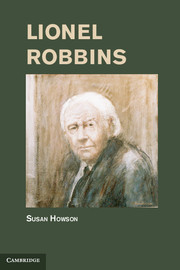Book contents
- Frontmatter
- Contents
- Illustrations
- Abbreviations
- Introduction
- One Father and Son
- Two The Great War
- Three Postwar
- Four The London School of Economics
- Five Iris Gardiner
- Six New College Oxford
- Seven The Young Professor
- Eight Fritz and Lionel
- Nine The School in the Mid-1930s
- Ten The Approach of War
- Eleven The Economics of War
- Twelve Director of the Economic Section
- Thirteen Anglo-American Conversations
- Fourteen The Law Mission and the Steering Committee
- Fifteen 1 9 4 4
- Sixteen The Last Months of the War
- Seventeen The Postwar Settlement
- Eighteen Return to the School
- Nineteen The End of the Transition
- Twenty LSE in the Early 1950s
- Twenty-One Chairman of the National Gallery
- Twenty-two Lord Robbins
- Twenty-three The Robbins Report
- Twenty-four The Sixties
- Twenty-five The Arts
- Twenty-six The Troubles at LSE
- Twenty-seven Retirement
- Conclusion
- Bibliography
- Index
Twenty-seven - Retirement
Published online by Cambridge University Press: 07 October 2011
- Frontmatter
- Contents
- Illustrations
- Abbreviations
- Introduction
- One Father and Son
- Two The Great War
- Three Postwar
- Four The London School of Economics
- Five Iris Gardiner
- Six New College Oxford
- Seven The Young Professor
- Eight Fritz and Lionel
- Nine The School in the Mid-1930s
- Ten The Approach of War
- Eleven The Economics of War
- Twelve Director of the Economic Section
- Thirteen Anglo-American Conversations
- Fourteen The Law Mission and the Steering Committee
- Fifteen 1 9 4 4
- Sixteen The Last Months of the War
- Seventeen The Postwar Settlement
- Eighteen Return to the School
- Nineteen The End of the Transition
- Twenty LSE in the Early 1950s
- Twenty-One Chairman of the National Gallery
- Twenty-two Lord Robbins
- Twenty-three The Robbins Report
- Twenty-four The Sixties
- Twenty-five The Arts
- Twenty-six The Troubles at LSE
- Twenty-seven Retirement
- Conclusion
- Bibliography
- Index
Summary
Lord Robbins retired from LSE three times: first, when he reluctantly gave up his chair in 1961; secondly when he reached the age at which he would otherwise have retired and his parttime appointment came to an end in 1966; and finally when he gave up the chairmanship of the governors in December 1973. But as far as he was concerned his retirement began when his ten-year term of office as chairman of the Financial Times finished at the end of December 1970. Then, as he had told his sister three months earlier, ‘I shall have to think out new ways of living.’
Robbins said his farewells to the staff at Bracken House on 31 December 1970, and on 4 January 1971 Garrett Drogheda (who succeeded him as chairman) gave a dinner for him and Iris with the board and a few senior staff: ‘All very agreable & friendly.…I couldn't have fallen among nicer people and the whole episode has meant a widening of experience and contacts which I could never have hoped for in any academic life…I shall miss all this a good deal.’ But he had plenty to keep himself occupied: the House of Lords, which he began to attend most days it was in session, the Royal Opera House, on whose board he remained until 1980, the National Gallery, his own writing and, most immediately, from the day after the FT dinner, the organization of the Library Appeal. He suspected, correctly, that for the next two and a half years he would be ‘quite as fully stretched as ever I have been by FT business & only a little less than I was with the report on higher education’.
- Type
- Chapter
- Information
- Lionel Robbins , pp. 1022 - 1078Publisher: Cambridge University PressPrint publication year: 2011

